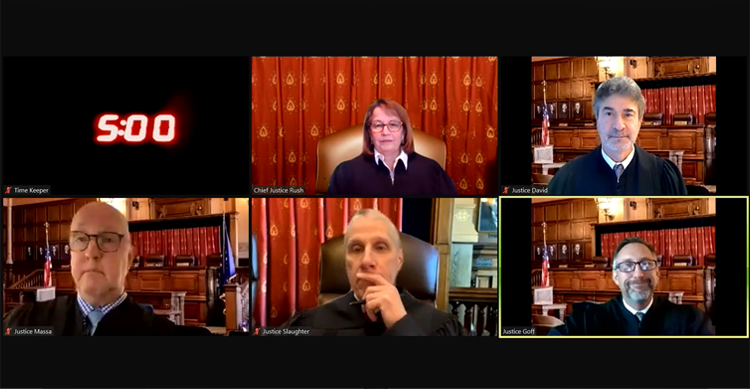By Heather R. Falks, Employment Attorney – ADA Coordinator | Office of General Counsel
Mask mandates are not a political issue; they are a liability issue. It makes good sense to instill safety protocols because it minimizes court liability, promotes public safety, and helps avoid court closures. As an employer, courts have a responsibility to their employees to protect them from COVID-19. They also have a duty as a public resource to protect the public from the virus. Nationally, employers are increasingly facing wrongful death lawsuits related to the deaths of employees or their family members who were exposed to the coronavirus when the employers refused to take minimal steps to ensure their safety.

Employers also potentially face legal liability under Indiana’s Worker’s Compensation laws, as it is possible that COVID-19 could be compensable as an occupational disease. If an employee can show a causal connection between their workplace and COVID-19 infection and exposure, then the employer may face liability.
If an employee were to sue for either wrongful death or worker’s compensation benefits, the employer’s liability would be evaluated by looking at the safety measures enacted by the employer. Politics would not be an acceptable defense. As an institution that the public looks to for guidance in the interpretation and application of the law, courts should be setting the example for safety when it comes to easily transmittable deadly viruses.
COVID-19: A DIRECT THREAT
The Equal Employment Opportunity Commission defines a “direct threat” as anything that poses “a significant risk of harm to the health or safety of the individual or others that cannot be eliminated or reduced by reasonable accommodation.” The EEOC has found that “based on guidance of the CDC and public health authorities as of March 2020, the COVID-19 pandemic meets the direct threat standard.” The virus poses a direct threat to employees and the public. The courts have a legal responsibility to take all necessary safety measures to protect both court employees and the public. Certain employees and members of the public are more at-risk than others due to disabilities and underlying conditions. The Americans with Disabilities Act prohibits employers and the government from treating individuals differently due to a disability. The ADA requires that reasonable accommodations be provided to permit those with disabilities to engage in employment and other public services; therefore, as both a government entity and an employer, the courts must provide reasonable accommodations that will allow for those who are at risk to engage in work and attend court.
ADA CONSIDERATIONS FOR THE AT-RISK
The Centers for Disease Control and Prevention opines that adults of any age with the following conditions are at risk of severe illness from COVID-19: cancer, chronic kidney disease, COPD, heart conditions, an immunocompromised state from an organ transplant, obesity, severe obesity, sickle cell disease, smoking, and type 2 diabetes. Additionally the CDC opines that individuals with the following conditions may be at an increased risk for severe illness related to COVID-19: asthma, cerebrovascular disease, cystic fibrosis, hypertension, a weakened immune systems, neurological conditions such as dementia, liver disease, overweight, pregnancy, pulmonary fibrosis, thalassemia, and type 1 diabetes. Individuals age 65 or older are also at a higher risk for complications. Any court employee or member of the public with one of the above listed conditions is at-risk for severe complications from COVID-19—including death—and the court has a duty to protect both its employees and the public from exposure.
Title I of the ADA prohibits employers from discriminating against employees with disabilities. As an employer, a court cannot exclude employees who are at-risk from the workplace merely because their disability places them at greater risk for COVID-19 complications. The ADA requires that the court provide necessary accommodations to protect those at-risk employees so that they can continue to perform their jobs without being placed at a greater risk. If there is an employee who is at-risk, the court should engage in the interactive process with that employee to determine what the best and most reasonable accommodation is to protect them. Although, the court cannot prevent an employee from coming to work due to their at-risk status; if an employee requests to work remotely due to a medically documented disability that places them at-risk, then the court must do an assessment of whether or not the requested accommodation can be provided. Part of this assessment involves looking at the following factors:
- Evaluating workplace safety measures already in place.
- Identifying additional safety measures that could be added to allow the employee to work at the office.
- Evaluating whether it is an essential function of the employee’s work to be in the office.
- Evaluating if the employee has demonstrated the ability to maintain performance standards while working remotely.
If a judge is presented with a request to work remotely as an accommodation, contact Heather Falks to assist with an evaluation of reasonableness.
Part of protecting court employees is regulating the actions of the public who enter court facilities. Title II of the ADA prohibits state and local governments from discriminating on the basis of disability in services, programs, and activities provided by State and local government entities. However, since COVID-19 has been declared a “direct threat” to employees, the court, as an employer and public service provider, has the duty to protect all employees and the public from this direct threat. Courts can take the following steps to protect the public and protect employees:
Mandate masks and symptom disclosure from the public entering court facilities
While members of the public may refuse to wear a mask for any variety of reasons, you are permitted to refuse them entry as a result of their decision, even if they claim to have a disability.
Mask mandates are not a political issue; they are a liability issue.
Have a plan for how to handle patrons who are refused entry due to symptoms or their refusal to wear a mask
The court should provide alternatives—such as virtual hearings—so that anyone who is unable to wear a face covering due to a disability has a reasonable alternative. If a member of the public asserts that they have a disability that prevents them from wearing a traditional mask, then a face shield should be offered as an accommodation because a face shield does not restrict the nose and mouth in the same manner as a mask. This reasonable accommodation can be offered without inquiry into the specifics of the patron’s disability. If the patron refuses any accommodation, then they must be denied entry and provided the opportunity for a virtual setting.
The court must have a process in place for dealing with these public safety scenarios, if a judge needs assistance with creating a policy, contact Heather Falks.
It is also important to remember that courts are mandating that certain members of the public enter court facilities, whether as a subpoenaed witness, a juror, or a defendant. This means that members of the public who may be at risk or who may live with an at-risk family member are being required to enter court facilities around the state, and the court owes these members of the public a minimum amount of safety from contracting COVID-19.
If the courts expect the public to honor subpoenas and to perform their public duty, then the courts must show respect by honoring the health and safety of those it calls to court. The public should be able to trust that the courts in Indiana are taking all necessary and possible steps to keep them safe when they are interacting with the justice system. It is entirely possible that the courts and other places of public accommodation could face lawsuits related to any failure to protect those who use public facilities.

RECOMMENDED SAFETY STANDARDS
The court can implement general safety standards in order to protect staff and the public—including protection for those who are at-risk. Those safety measures include the following:
- Social distancing: No employees should be working in shared spaces where they cannot maintain at least six feet of distance from coworkers. Workspaces may need to be reconfigured, and/or staff may need to be placed on rotating schedules. Desks should also be moved away from counters used by the public. All seating in the court room should be marked for social distancing. Hearings should be staggered so that people are not grouping together in a fashion where social distancing cannot be enforced.
- Plexiglass shields: Plexiglass should be placed at all counters where staff are required to interact with the public and areas in the courtroom such as the court reporter’s desk to act as an extra shield from public interaction. Plexiglass shields can also be added to other workspaces where there is frequent interaction with the public.
- Mandate masks: Masks must be worn in all common areas at all times, including within the court offices. If employees work together in a common space, then they must wear masks. When using the restroom masks must be worn. Anytime an employee leaves their private office they should be wearing a mask. Everyone in the courtroom must wear a mask at all times—unless they are the witness who is testifying. Some courts have opted to allow the questioning attorney to remove their mask, this may be acceptable at times; however, it is important to remember that the more people without masks increases the risk of spreading infection. See COVID-19 protocol on resuming court operations.
- Checking Symptoms: All members of the public should have their temperature checked before entering the building or courtroom. All members of the public should be asked if they have any COVID symptoms before entering. Employees should check their own symptoms, including their temperature every day before coming to work.
- Frequent sanitation: All areas of high traffic must be cleaned regularly. There should be sanitization wipes immediately available to wipe down used surfaces, or there should be a frequent cleaning schedule in place to sanitize those touched frequently.
- Widely available personal protection equipment (PPE): There should be stations within the court and court office where employees and the public can obtain masks, gloves, and hand sanitizer. Signs should be placed throughout the court and office stating that masks are required and directing people to PPE stations.
- Liberal sick policies: The court needs employees to report all signs of illness—even minor signs of illness so that a sick employee can be moved to remote work in order to prevent an outbreak occurring at the office. Employees should not feel that they have to choose between using their personal time and protecting their co-workers. The court should have a plan in place for using remote work to keep sick employees from coming into the office. This will become especially important during flu season.
- Remote work options: Courts should be working to make sure that all staff can work remotely if necessary. The ability to allow employees to work remotely if needed will lessen the likelihood of employee-to-employee transmission because a sick employee can be immediately moved to remote work. The court should be working with their county and IT departments to make sure that staff have the access to court files that they need to perform their work. If this is not possible then, at a minimum, the court should prepare a list of special projects that an employee could work on remotely such as research or organizational tasks.

Masks are a key tool to preventing an outbreak at your courthouse. As winter and the flu season approaches it is even more necessary for all courts to be taking all available safety measures to keep their staff and the public safe. Mandating masks and other basic safety measures will help limit the likelihood that your court will have to close due to an outbreak.
The Governor has ordered masks as mandatory in all public spaces pursuant to his emergency powers in IC 10-14-3-12, and there are no exceptions for public judicial branch facilities. Intentional refusal to follow a lawful emergency order could lead to disciplinary action. Court employees are also mandated to follow the law. Any reports of judges refusing to comply with mask mandates will be taken seriously, and judges will be held accountable. Please contact Adrienne Meiring with any questions concerning a judge’s ethical obligation to comply with mask mandates.
